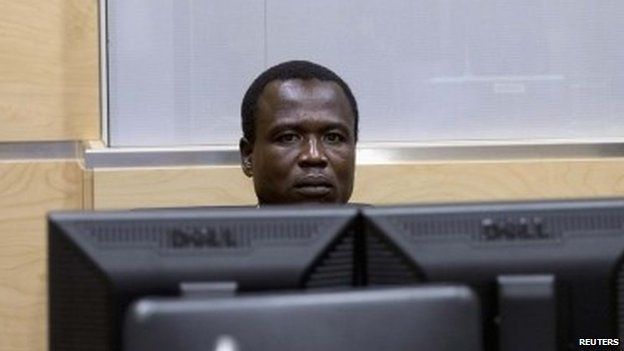LRA commander Dominic Ongwen appears before ICC in The Hague
- Published

Top Ugandan rebel commander Dominic Ongwen has appeared in the dock at the International Criminal Court (ICC) in The Hague to face war crimes charges.
Mr Ongwen, a feared commander of the Lord's Resistance Army (LRA), is the first member of the LRA to appear before the court.
During the pre-trial hearing he was asked to confirm his identity.
He faces a total of seven counts of crimes against humanity and war crimes, including murder and enslavement.
The charges all relate to an attack on a camp for internally displaced people in Uganda in 2004.
Mr Ongwen was not required to enter a plea on Monday. Judge Ekaterina Trendafilova set the date for his next appearance as 24 August, when hearings will determine if he should face trial.
The LRA is accused of seizing children to use as fighters and sex slaves.
The BBC's Anna Holligan in the courtroom
Dominic Ongwen's comfortable green army fatigues have been replaced with a navy tailor-made suit. He looked uncomfortable and unstable on his feet. The sterile courtroom is unfamiliar territory. Usually seats are reserved for "family" in the public gallery. In Dominic Ongwen's case there are only media, NGOs and diplomats.
He looked out at us watching him and blinked rapidly as the official photographers captured his image. Security guards helped Mr Ongwen to place his headphones.
Mr Ongwen's story encapsulates many of the complexities of the LRA conflict - a child groomed in the image of his oppressors. His past is likely to present some ethical and legal dilemmas for the ICC, a court which is fiercely outspoken on the use and abuse of child soldiers.
His lawyers are likely to use his traumatised youth as a part of a plea for leniency. The big question will be whether Mr Ongwen will reveal the whereabouts of his former commander-in-chief. LRA leader Joseph Kony is one of the ICC's most wanted suspects.
The prosecution is not expected to formally put its case for some time.
Mr Ongwen wore a blue suit, white shirt and chequered tie in court. He identified himself as born in Gulu in northern Uganda in 1975.
"I was abducted in 1988 and I was taken to the bush when I was 14 years old," he said in Acholi, the language widely spoken in northern Uganda. "Prior to my arrival at court I was a soldier in the LRA."
Mr Ongwen - who now has short hair rather than his trademark dreadlocks - was arrested after giving himself up in the Central African Republic last month. Last week he was delivered to the ICC.
His transfer "brings us one step closer to ending the LRA's reign of terror", ICC chief prosecutor Fatou Bensouda said in a statement last week.
Uganda agreed to an ICC trial for Mr Ongwen despite being a fierce critic of The Hague-based court.
US and African forces had been searching for the defendant since 2011.
He is said to be the deputy to LRA commander Joseph Kony, who is still on the run.
Who is Dominic Ongwen?
- Said to have been abducted by LRA, aged 10, as he walked to school in northern Uganda
- Rose to become a top commander
- Accused of crimes against humanity, including enslavement
- ICC issued arrest warrant in 2005
- Rumoured to have been killed in the same year
- US offered $5m (£3.3m) reward for information leading to his arrest in 2013
The UN Security Council and UN Secretary-General Ban Ki-moon both welcomed Mr Ongwen's transfer to the ICC.
His extradition came nearly 10 years after he and four other LRA top commanders were charged.
Two have since died, leaving Mr Kony and Okot Odhiambo still at large.
Mr Ongwen is accused of committing atrocities against civilians in Uganda and in parts of Central African Republic, South Sudan and DR Congo.
The LRA rebellion began more than two decades ago in northern Uganda and its estimated 200-500 fighters - many of them child soldiers - have since terrorised large swathes of central Africa.